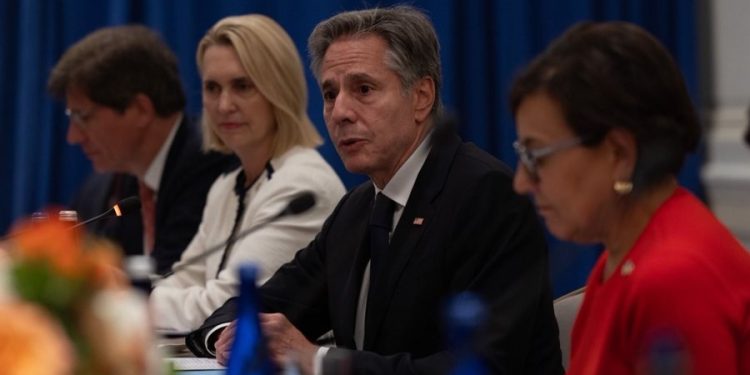By Blessing Chinagorom
The United States Secretary of State, Antony Blinken has confirmed that 100 hostages have been released and be reunited with their families during the 7days humanitarian pauses which facilitated release of hostages, enable more assistance to get into Gaza, and help get innocent civilians out of harm’s way.
Blinken, in his remarks to Press on Friday could not give full details on the hostages release, also confirmed that the humanitarian assistance during the period of the truce was more than double getting to people who need it so desperately in Gaza.
US Secretary made it known that this is the third visit to the Israel’s region since Hamas slaughtered men, women, and children on October 7th, adding that during the first visit that he made, came to show strong solidarity with Israel defending itself.
“And trying to make sure that October 7th never happens again; and also, to stress the importance of humanitarian assistance getting to people in need in Gaza. After that visit, the humanitarian assistance began to flow”, he said.
Blinken continued that his second visit, focused on how pauses, humanitarian pauses, could facilitate release of hostages, enable more assistance to get into Gaza, and also help get innocent civilians out of harm’s way. “After that visit, we saw Israel institute pauses that got – enabled people to get out of harm’s way.
“We were able to broker a deal with Qatar, with Egypt playing critical roles for a 7-day pause. And as a result, some 100 hostages were able to get out and be reunited with their families. And in addition, as I said, we’ve seen humanitarian assistance during that period more than double getting to people who need it so desperately in Gaza”.
He pressed further that this visit is to get more hostages out of Gaza and out of the hands of Hamas, looking at how to sustain increase the humanitarian assistance that’s getting to the people in Gaza, and talking about the way forward and Israel’s efforts to make sure that Hamas never again has the ability to do what it did on October 7th.
Blinken made it clear that after the pause it was imperative that Israel put in place clear protections for civilians and for sustaining humanitarian assistance going forward.
He said, “And as we’ve seen just today, Israel has already moved out on parts of that, including sending out information, making it clear where people can be in safe areas in Gaza. And we’ll be looking at that going forward. It’s very, very important.
Giving the reason why the 7-days pause came to an end, the US Secretary explained that Hamas reneged on commitments made. “In fact, even before the pause came to an end, it committed atrocious terrorist attack in Jerusalem, killing three people, wounding others, including Americans.
“It began firing rockets before the pause had ended. And as said, reneged commitments it made in terms of releasing certain hostages. We remain intensely focused on getting everyone home, getting hostages back. It’s something that I also worked on today. So, we’re still at this.
“We’re also very much focused, as we’ve been all along, on trying to make sure that this conflict doesn’t spread, that it doesn’t escalate in other places.
“But we’re also using our diplomacy to look at not only what’s happening today and how we’re handling that, but also what happens the day after in Gaza and how we can get on the path to a just, lasting, and secure peace for Israelis, for Palestinians, in fact, for everyone in the region. And that’s also a big focus of our diplomacy”.
Blinken who had the opportunity to meet with a number of colleagues from across the region, said their conversation focused on all three aspects of what “we’re doing, which is day after in Gaza, the path to durable, lasting, secure peace for everyone concerned. We have to be doing all of that, and we have to be doing all of that at the same time.
“A lot of it requires hard work, tough decisions, commitments that various countries will have to make. We know from many years of experience none of it will be easy, but I think it’s more imperative than ever. So that’s the work of our diplomacy day-in, day-out. That’s why the United States is here, to engage”, he said.
Gaza’s crisis: 100 hostages reunited with families, Blinken confirms
Please login to join discussion














